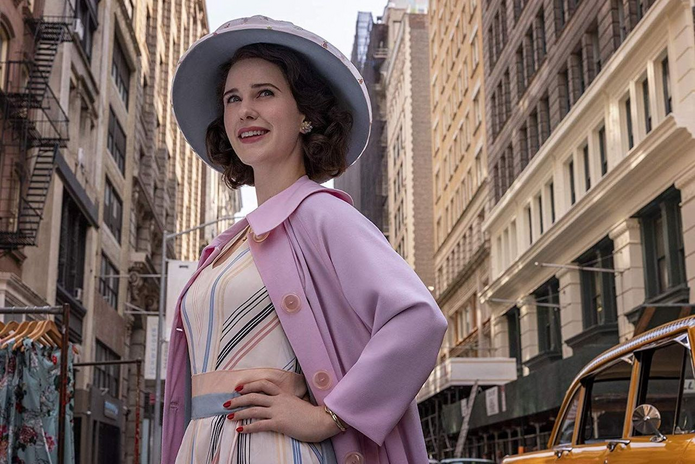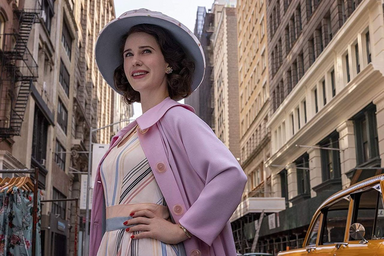With the most recent wave of antisemitism around the country, Jewish representation in media and especially on screen is more important than ever before. A 2020 article published in The Atlantic reports that less than 3% of Americans identify as Jews and 35% of them have experienced antisemitism in the past five years. Some people may deny the existence of a Jewish representation issue — after all, iconic shows like Josh Schwartz’s The OC and Gossip Girl make references to Judaism, including Seth Cohen’s creation of Chrismukkah and Cyrus Rose’s Passover seder. We even have more recent examples, with The Marvelous Mrs. Maisel’s fourth season coming out soon, plus the newly released Licorice Pizza‘s treatment of the nuances of Jewish faith and ethnicity. But we need to look at the bigger picture.
There’s an old antisemitic stereotype that “Jews run Hollywood.” This line of thinking only perpetuates stereotypes of the wealthy, white Jew, further contributing to antisemitism. Plus, numbers aren’t everything. While there are certainly more than a few Jewish characters on screen, I’d argue that Hollywood has a long way to go, if “representation for all” truly means “representation for all.”
Unfortunately, the truth is that with Hollywood representation movements like #OscarsSoWhite and other pushes for more Black and queer stories on screen, Jewish representation is undeniably left out — and it’s not because of their stereotypical whiteness. While 83% of American Jews are white, that 17% of non-white Jews including those with Black, Asian and Hispanic heritage still deserve to have their stories told. Judaism is getting progressively less white, though a 2021 study commissioned by the Jews of Color Initiative notes that this path is fraught. A majority of the 1,100 Jews of color surveyed reported that their specific needs are not being addressed by their communities, and one participant interviewed explained that much of Jewish-American life centers on a white Jewish experience.
If Hollywood is pushing so hard for racial inclusion, then why can’t they include Jews of all races and backgrounds in that quest?
Of course, Hollywood alone isn’t entirely responsible for this much larger issue, but there is a dire need for intersectional storytelling that de-centers this white experience. If Hollywood is pushing so hard for racial inclusion, then why can’t they include Jews of all races and backgrounds in that quest? Let’s stop showing Jews as only one type of people and start showing them as they really are, belonging to a diverse and culture-rich community.
So, where has Jewish storytelling on TV gotten us so far? The OC, by far one of the most prominent Jewish TV shows distanced itself from common Jewish TV tropes like that of the “New York Jew,” seen on The Nanny and Seinfeld, with its Newport, California setting. It also incorporated Jewish traditions and culture like learning about the Haggadah into its regular programming. Gossip Girl lacks a Jewish main character and does come from the wealthy white New Yorker point of view, but at least made an effort to include aspects of Jewish faith and culture like saving Elijah’s seat at the Passover seder. It also featured many Jewish figures as guest stars, including Rachel Zoe, Isaac Mizrahi, and (unfortunately) even Jared Kushner and Ivanka Trump. While both The OC and Gossip Girl were both overwhelmingly white, for the time they were airing Schwartz opened doors for more Jewish characters.
But The O.C. and Gossip Girl both wrapped over a decade ago. That leaves The Marvelous Mrs. Maisel on Amazon Prime as the most widely known “Jewish show” currently on TV. This project by the creators of Gilmore Girls, has won multiple Golden Globes and Emmys for its portrayal of Midge, a Jewish wife in the late 1950s who starts doing stand-up comedy to provide for her family. The series is flooded with Jewish references, such as women playing Jewish mahjong, eating Kugel, wearing Yarmulkes, converters being more religious, celebrating Tisha B’av, references to the Mi Seberach prayer book, a Bris, having mezuzahs, Yom Kippur, Bar Mitzvahs, and plenty of Yiddish slang. This is all great — but like many of her Jewish predecessors on screen, Midge is white and wealthy.
Continuing to portray Jews as exclusively white and wealthy only perpetuates stereotypes and can encourage antisemitism.
Even beyond Maisel, we know there’s a place for (some) Jewish stories on TV. Broad City and Crazy Ex-Girlfriend were both created by Jewish women. The Goldbergs and Schitt’s Creek also both feature Jewish families (though while their Jewishness is often referenced on these shows, there aren’t many examples of them practicing Jewish traditions). Back in the 1990s, Seinfeld, Friends, and The Nanny each featured some Jewish references. Entourage’s scene-stealer Ari Gold was Jewish and an entire episode was dedicated to his daughter’s Bat Mitzvah. Glee had many Jewish characters, and the Puckerman brothers even covered the traditional Hanukkah song “Hanukkah, Oh Hanukkah.” But aside from a few exceptions, almost all of these portrayals are white, cis, and straight.
This isn’t accurate to the full range of experiences that Jewish people have. Some live in small towns or low-income households, some have queer relationships and/or interracial families. There are also BIPOC Jews that live wealthy lifestyles. Where is all of this representation on screen? Continuing to portray Jews as exclusively white and wealthy only perpetuates stereotypes and can encourage antisemitism, like when people throw coins at Jews or assume that they are greedy and money-hungry when usually it’s the opposite. This is why Never Have I Ever‘s treatment of Ben Gross’s wealth, for example, garnered so much criticism from the Jewish community.
Now, these shows do some things right. They make Jewish references with ease instead of excessively forcing them to make it overwhelmingly known to the viewer that “this character is Jewish.” Blair Waldorf tells her soon-to-be stepfather Mazel Tov before his wedding to her mom, and the Cohen family’s favorite meal is bagels and schmear. On Glee, Puck sings songs by many Jewish icons like Neil Diamond and fellow Jew Rachel idolizes Jewish Oscar winner, Barabra Streisand. Their Judaism is a quiet reality rather than a flamboyant product of tokenization. However, this is a double-edged sword, because it means many stories about Jewish faith are put on the back burner.
Hollywood also tends to capitalize on Jewish representation when certain holidays roll around, despite the fact that many practice Judaism 365 days a year.
Holiday episodes are a prime example of this phenomenon in action. There are plenty of Christmas episodes, but where are the Hanukkah episodes? Even when the characters are Jewish, their shows more often than not still have Christmas-centric storytelling. Friends also prioritized Christmas episodes, even though two out of its six main characters are Jewish. Even The OC’s Chrismukkah, meant to combine Christian and Jewish traditions, was still mostly focused on Christmas traditions. Glee had many Christmas episodes where the Jewish characters, especially Rachel, would sing lead on Christmas classics like “Last Christmas.”
Hollywood also tends to capitalize on Jewish representation when certain holidays roll around, despite the fact that many practice Judaism 365 days a year. I want to see family trips to Israel, or Shabbat dinners every Friday night that the teenagers try to get out of. Where are the Bar and Bat Mitzvahs? Where are the Shivas? Where is the nuance?
Like any minority, religious or otherwise, a small offering of stereotypical representation isn’t enough. More can always be done. The stories worth telling don’t have to focus on one portion of a population when so many insightful points of view are still waiting their turn. There are a number of steps Hollywood can take in the future: producers can hire more Jewish writers and actors of color. Writers can do more research into antisemitism and stereotypes, and not only avoid pushing antisemitic narratives, but also address antisemitism on-screen for the audiences that need to hear it. Shows can talk about and celebrate Jewish life and faith even when it’s not Hanukkah or Passover.
There are many stories out there to be told, and many people are waiting to see themselves reflected on screen — Jews included.


